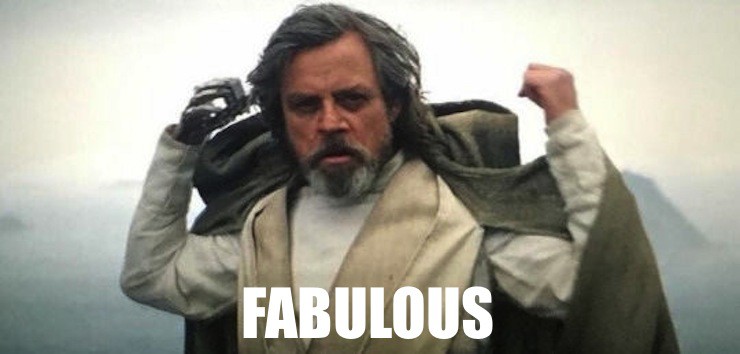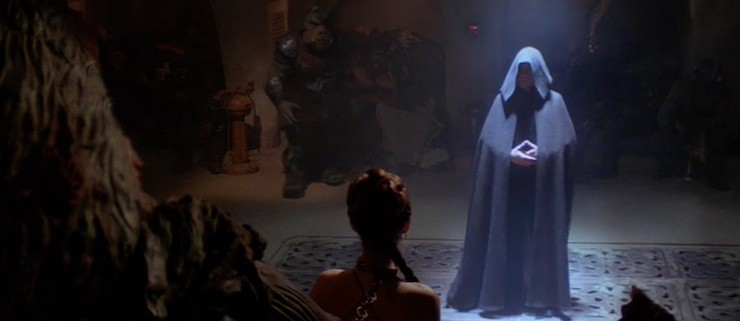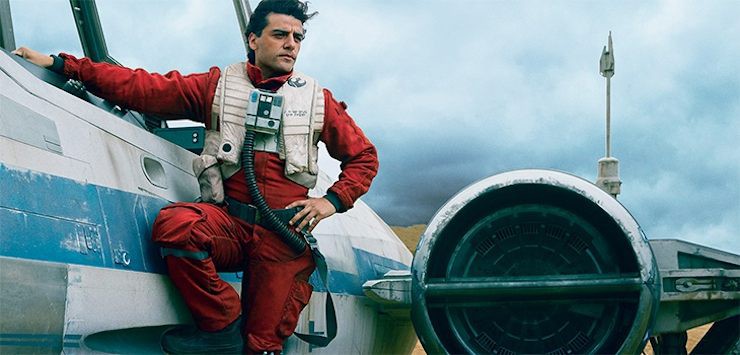Following J.J. Abrams’ statement that Star Wars should feature a broader spectrum of sexuality in the upcoming films, Mark Hamill suggested in an interview with the Sun that Luke Skywalker might be gay.
On the positive side—Mark Hamill is an awesome guy. On the practical side—I have one very specific problem with this idea….
To provide context, here is Hamill’s full quote on the issue:
“But now fans are writing and ask all these questions, ‘I’m bullied in school… I’m afraid to come out’. They say to me, ‘Could Luke be gay?’ I’d say it is meant to be interpreted by the viewer.
“If you think Luke is gay, of course he is. You should not be ashamed of it. Judge Luke by his character, not by who he loves.”
The sentiment is sweet, if not particularly useful on the representation front; allowing fans to “decide for themselves” if Luke is gay is a perfectly valid exercise, but still not helpful in giving them a canonical example they can point to when they’re looking for role models. If everyone simply decides at their leisure, it also means that straight fans of Star Wars never have to confront the possibility of Luke Skywalker as a gay man—they are more likely to align him to what they relate to and see most often.
Still, if Abrams is heeded and the future filmmakers decide to reveal a queer character in the upcoming films, Luke is a possibility for that reveal. (I know, he was smooched by Leia. One weird kiss with your sister does not a straight man make.) And while, as a queer person, it would mean the world to me for my childhood hero to “come out” as a gay man, I’m not sure it’s such a great idea all by itself.
The reason? Well, mostly because it would make him into Albus Dumbledore 2.0.
While I’m a fan of the backstory given to Albus Dumbledore by J.K. Rowling (being that he was a gay man who never appears to have had a requited relationship due to his ill-considered crush on a dark wizard when he was barely out of his teen years), it would be a shame if he became a trope: the wise old sage of the current generation who carries a great deal of guilt on his shoulders, sacrifices most of his life out of a desire to combat evil, and also happens to be a gay man who never acts on any of his desires. Granted, there’s no reason why Luke couldn’t have had a relationship(s) in the time between Return of the Jedi and The Force Awakens. But given the information left to us, it does seem more probable that Luke devoted his life to training other Jedi, and didn’t pursue romance in the midst of that work.
If he were suddenly revealed as a gay character in lieu of all that, his sexuality could be perceived by the audience as tragedy. Poor Luke Skywalker, who devoted his life to others and never got the things that he wanted for himself. Or worse, some might think that his current lot in exile could be blamed on his sexuality, that if he had been more “virtuous” he would have been spared the incredible pain he has experienced in his life. (And before you say that’s nonsense, there were fans of Harry Potter who believed that Dumbledore’s sexuality was meant to be a lesson against queerness; that the loss of Albus’ sister Ariana was meant to teach him “the cost” of what he wanted and how he felt.)
When Abrams brought up the need for queer characters in Star Wars, he said, “To me, the fun of Star Wars is the glory of possibility.” But possibility, at its core, is about expanding vernacular, not playing around with the current vocabulary. For Star Wars to embrace the “glory of possibility” in the same manner as every other fictional narrative is a dismal thought. Instead, fans are holding out for more—look through Star Wars tags on Tumblr and you’ll see posts running the gamut of possibility. What if Rey were asexual? What if there were interspecies relationships that involved humans? What about polyamorous households? Are there any trans Resistance pilots? These questions seem only logical for a universe that purports hundreds of species and worlds to explore. Being owned by the Disney juggernaut may be a barrier to these leaps forward—giant corporations tend to make all their decision based on the what-makes-the-most-money principle—but that shouldn’t prevent the creative minds behind these projects from shooting for the moon.
Which brings me to the fan favorite in the Who Should Be the New Queer Star Wars Character poll: Poe Dameron. Because I think that there are fans out there who don’t truly understand the appeal of Poe turning out to be gay (or even bi/pansexual) in the upcoming films. It’s not just that he has a chemistry with John Boyega’s Finn that can easily be read as serious flirtation. Poe Dameron is the total package—a confident, kind, anchored human being. He is sure of himself and the work that he’s doing, but more than that, he is dearly important to the Resistance and trusted by his friends and colleagues. There is an inherent happiness about Poe, a sparkly can-do attitude that gives the viewer hope.
For all those reasons, Poe is precisely the kind of character who would make an impeccable gay role model. (This is, of course, provided that he lives through the entire trilogy.) Also, Oscar Isaac is Latino and queer POC are woefully underrepresented in media of every kind, so we have another important reason. Finn and/or Rey would be excellent choices as well, but I’m convinced that fandom’s centeredness on the possibility of Poe being queer is no accident. LGBT+ fans are trying to communicate the sort of examples that we are often left without. The ones whose lives and backgrounds aren’t tragic, but uplifting. Who command respect and loyalty. Who are loved and offer their love in return, and aren’t punished for it. Who are allowed to be bubbly, emotional, and dynamic.
It’s also extremely relevant that Poe is in the “correct” age range to be considered a romantic lead by Hollywood standards. (While I do love the thought of an older Luke pursuing some gentleman after he finishes Rey’s training, I’m not holding my breath on a plotline like that coming true.) We cannot perpetuate the premise of an audience only being comfortable with queer people when those characters are seemingly celibate and detached. This stigma is even truer for gay men; because while a show or film can pass off a kiss between women as something “for the guys,” the fear of alienating a male audience often leads to the opposite where male couples are concerned. To have a character like Poe actively flirting with other men would have a huge impact on the broad audience that Star Wars has always garnered.
These are important aspects to delve into when we talk about the improvement of entertainment, even if they seem overly-specific. In this day and age, we know that representation shouldn’t simply be a list of boxes that we tick off one by one. No one should get praise for that. When creatives and companies think of these decisions as an appeasement or placation, they don’t broaden anyone’s horizons or create good stories. It’s not about reaching a quota or being behind (or ahead) of the curve. It’s not about feeling good that you “did your part.” It’s about abolishing laziness. It’s about making better choices that elevate marginalized voices. It’s about offering audiences enough variety in your cast of characters that every person can find the hero (or antihero or villain) that they need.
So while the idea of Luke Skywalker being gay is admittedly wonderful, decisions like these still demand careful consideration if future Star Wars films truly do commit to having queer cast members. These characters should benefit and enrich the landscape that they are a part of, invite people in rather than turn them away. They should veer from the current Hollywood-approved version of the queer experience, and offer fans a reflection of themselves that inspires. While it’s all speculation at the moment, the more audiences talk about what matters, the more likely we are to see change and avoid perpetuating depressing tropes.
Emmet Asher-Perrin does love the idea of Luke being gay, though. Without the tragedy. You can bug her on Twitter and Tumblr, and read more of her work here and elsewhere.












